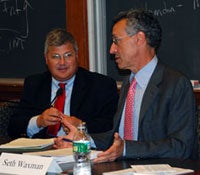The Supreme Court’s recent decisions on the rights of detainees in the war on terror have raised as many questions as they’ve answered, and the legal terrain remains highly unsettled and “sub-optimal,” said former US Solicitor General Seth Waxman at a Harvard Law School forum on September 9.
Waxman, now a partner at WilmerHale, is widely considered one of the country’s premier Supreme Court and appellate advocates. He served as solicitor general of the United States from 1997 through January 2001. Earlier this year he won a landmark ruling in Boumediene v. Bush, in which the Supreme Court ruled that foreign citizens held at Guantanamo Bay have rights under the Constitution to challenge their detention in US civilian courts.
At the law school event—a Dean’s Forum moderated by HLS Dean Elena Kagan ’86—Waxman was joined by Professor Jack Goldsmith, an expert on issues of law and terrorism, for a wide-ranging discussion of the Boumediene case and the three earlier cases in which the Court has addressed post-9/11 constitutional and statutory questions. (Watch a webcast of the discussion.)
Goldsmith, who served as head of the Justice Department’s Office of Legal Counsel, joined the HLS the faculty in 2004. He is the author of “The Terror Presidency,” a 2007 book that details the legal issues the Bush administration faced, and continues to face, in the war on terror, including the definition of torture, the applicability of the Geneva Conventions to the war on terror and the Iraq War, the detention and trial of suspected terrorists at Guantanamo Bay and elsewhere, and wiretapping laws. In the book, he argues that, despite his sympathy for the motivations behind the Bush administration’s terrorism policies, the administration’s approach in its response to the events of 9/11 was counterproductive.
Goldsmith reiterated that point in the forum event, but added that Congress, too, had not done enough in this area. He said the next Congress should not delay in holding hearings and clarifying the law on terror-related issues, which should be a top priority of incoming legislators and a new administration, hopefully working in tandem.
Waxman and Goldsmith traced the development of the Supreme Court’s post-9/11 rulings on the rights of terrorism detainees. Most of the discussion focused on the case of Boumediene, a naturalized citizen of Bosnia and Herzegovina, held in military detention by the United States at the Guantanamo Bay. The case challenged the legality of Boumediene’s detention at Guantanamo Bay as well as the constitutionality of the Military Commissions Act (MCA) of 2006. In June, the Supreme Court ruled 5-4 that the prisoners had a right to habeas corpus review under the United States Constitution, and that the MCA was an unconstitutional suspension of that right.
Waxman, who continues to represent Boumediene, is now preparing for a trial of the case scheduled for October in U.S. district court for the D.C. Circuit. He said that the pre-trial preparation is especially challenging because the Supreme Court did not specify what kinds of procedural protections should be available. For example, Waxman asked, is the Government obligated to turn over any exculpatory evidence suggesting that Boumediene was not an enemy combatant? That question, and many others, remain unanswered, he said.
Goldsmith warned of the “law of unintended consequences,” predicting that the military might find ways to detain and hold prisoners abroad, in places not covered by court rulings granting more and more procedural protections to detainees held on US territory.
Waxman answered that if such protections are not available, hostile governments will increasingly limit the procedural rights they give to Americans on foreign soil, and will be impervious to US complaints and diplomatic pressure.
— Robb London
